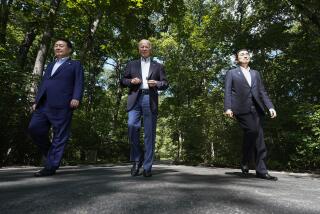No Easy Answer to Asia’s Money Woes
- Share via
KUALA LUMPUR — OK, this is not a “Wag the Dog” story. President Clinton didn’t actually create the showdown with Iraq to get out of attending the annual summit of leaders from the Asia-Pacific region.
But maybe it’s good that Clinton stayed home in Washington. Because by passing up this summit, the president avoided having to respond to far-reaching questions over the causes of the financial havoc that has engulfed Asia.
Standing in for Clinton, Vice President Al Gore made headlines here this week with a bit of rhetoric in support of political freedom in Malaysia. That’s a worthy cause, though not a new one: America has rightly come out in support of democracy in Asia before, and it will no doubt do so again.
Yet Gore’s showy proselytizing served to deflect attention away from the more complex economic issue that has preoccupied Asia: whether globalization and international movements of capital sometimes unjustly harm some countries and innocent people.
That is a question for which the Clinton administration--which regularly extols the virtues of globalization--has no easy answers.
“I can well imagine that Bill Clinton doesn’t want to go [to the Asian summit],” retired UC San Diego professor Chalmers Johnson observed last week, before the president decided to stay home. “If there’s anything that’s dead in the water in Asia right now, it’s the idea of globalization.”
The main policy question concerning globalization is whether there should be some restrictions imposed upon the instantaneous flow of capital around the world.
It was the sudden and massive withdrawal of money from overseas that brought about economic turmoil in Thailand, South Korea, Indonesia and Malaysia. By contrast, China, whose currency is not freely convertible, has so far suffered much less.
In Asia, the most outspoken proponent of capital controls happens to be Malaysian Prime Minister Mahathir Mohamad--the same mercurial figure whom Gore challenged Monday by endorsing democracy for “the brave people of Malaysia.”
As an authoritarian political leader, Mahathir’s political views and behavior are so reprehensible as to be beneath serious discussion. The recent arrest of his former aide and finance minister, Anwar Ibrahim, on charges of sexual misconduct, seems like a flagrant abuse of power.
Mahathir’s economic views, however, are at least worthy of some debate. Three months ago, he imposed limits on the flow of capital into and out of his country, and he has maintained these restrictions ever since.
This last weekend, speaking as the host of the Asia Pacific Economic Cooperation (APEC) summit, Mahathir launched a full-scale attack on the notion that currency should be permitted to move freely around the world. He made a series of arguments that could well strike a chord in Asia in the wake of the past year’s financial crisis.
“Tens of millions of poor workers lose their jobs and are starving because of currency trading, not to mention the loss of wealth of many developing countries, which runs into hundreds of billions of dollars,” Mahathir said.
Speaking of Malaysia’s current restrictions on capital outflows, Mahathir claimed that “we have not hurt anyone, except the currency traders. . . . Many great economic and financial minds seem to think that we have done something that can damage the process of liberalization and globalization of the world financial system. We cannot. We are too small.
“Why not leave Malaysia alone with its idiosyncrasies? If we are wrong, then we will pay the price. It would serve us right. But the world community would have learned something and be better off for it.”
Mahathir is far from alone in arguing the merits of currency controls. Within the United States, even some leading apostles of unfettered free trade, such as Columbia University economist Jagdish Bhagwati, have recently begun to argue that restrictions on capital flows may make sense; such critics say the movement of money is different in nature from trade in manufactured goods.
Mahathir’s speech seemed to call for a detailed response from the United States. But at the summit meeting here, the Clinton administration had little to say on this subject.
In his speech Monday, Gore merely restated the American opposition to currency controls. The vice president touched briefly on the phenomenon of capital flight--and in so doing raised more questions than he answered.
“We can now move capital around the world at the touch of computer key,” Gore said. “But when that capital flows into weak financial systems whose dangers are obscured by poor transparency, the same capital can flow out just as fast--leaving debt and dislocation in its wake. The resulting contagion can then unfairly damage even sound economies.”
To these words, Asian leaders might well have asked Gore: Does it have to be this way? Can’t we try to do something to fix a process that you admit is unfair?
In short, the American vice president found it easier to attack Mahathir as a political autocrat than to rebut his views on the global economy.
Overall, the American performance at the summit of Asian leaders seemed to reinforce Asian impressions of the United States as a remote superpower out of touch with the way the financial crisis has devastated many countries here.
At the same Asian summit one year ago, Clinton brushed off the financial crisis, then in its early stages, as just a bump in the road.
What was then a bump seems now more like an abyss. But because of the confrontation over Iraq, Clinton was spared the embarrassment of having to explain to Asian leaders that he was wrong.
Jim Mann’s column appears in this space on Wednesdays.
More to Read
Sign up for Essential California
The most important California stories and recommendations in your inbox every morning.
You may occasionally receive promotional content from the Los Angeles Times.













